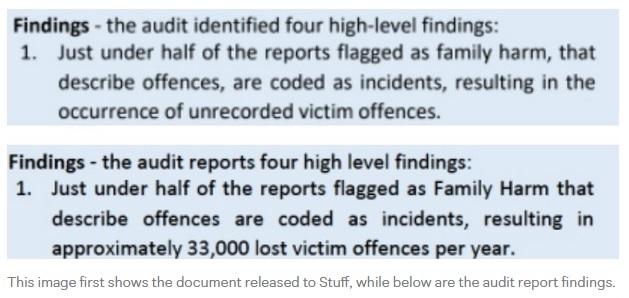Stuff has a story this morning about the police juking the domestic violence stats, downgrading family violence crimes to "incidents" so they don't have to be investigated (and so Bad Number doesn't Go Up). That's appalling in and of itself, for the human consequences, and for what it says about the police's attitude to victims, their job and to accountability. But there's another appalling thing buried well down in the story: the police lied in an OIA response:
It said it did not release the full report publicly in line with “standard practice”. The 33,000 number was left out of a summary provided to Stuff under the Official Information Act because it could have been “misinterpreted”, it said. It only decided to release the full text after the Ombudsman stepped in.The difference can be seen in the screenshot below:
The Ombudsman has apparently decided that releasing an intentionally misleading summary was wrong. But it raises other questions as well - namely whether protecting your institutional reputation is a "benefit", or whether depriving the public of information they are entitled to causes "loss". Because if either is true, the police staff responsible for this fraudulent release may in fact have committed the crime of altering, concealing, destroying, or reproducing documents with intent to deceive.
And if the answer to those questions is "no", we ought to be asking ourselves why lying in an OIA response is not a crime. It is in other countries, and the Ombudsman has recommended that we adopt similar provisions here. With agencies actually being caught lying in their responses, maybe the government should make that a priority? Because if agencies can just lie without consequences, the law means nothing, and public trust is dead.






